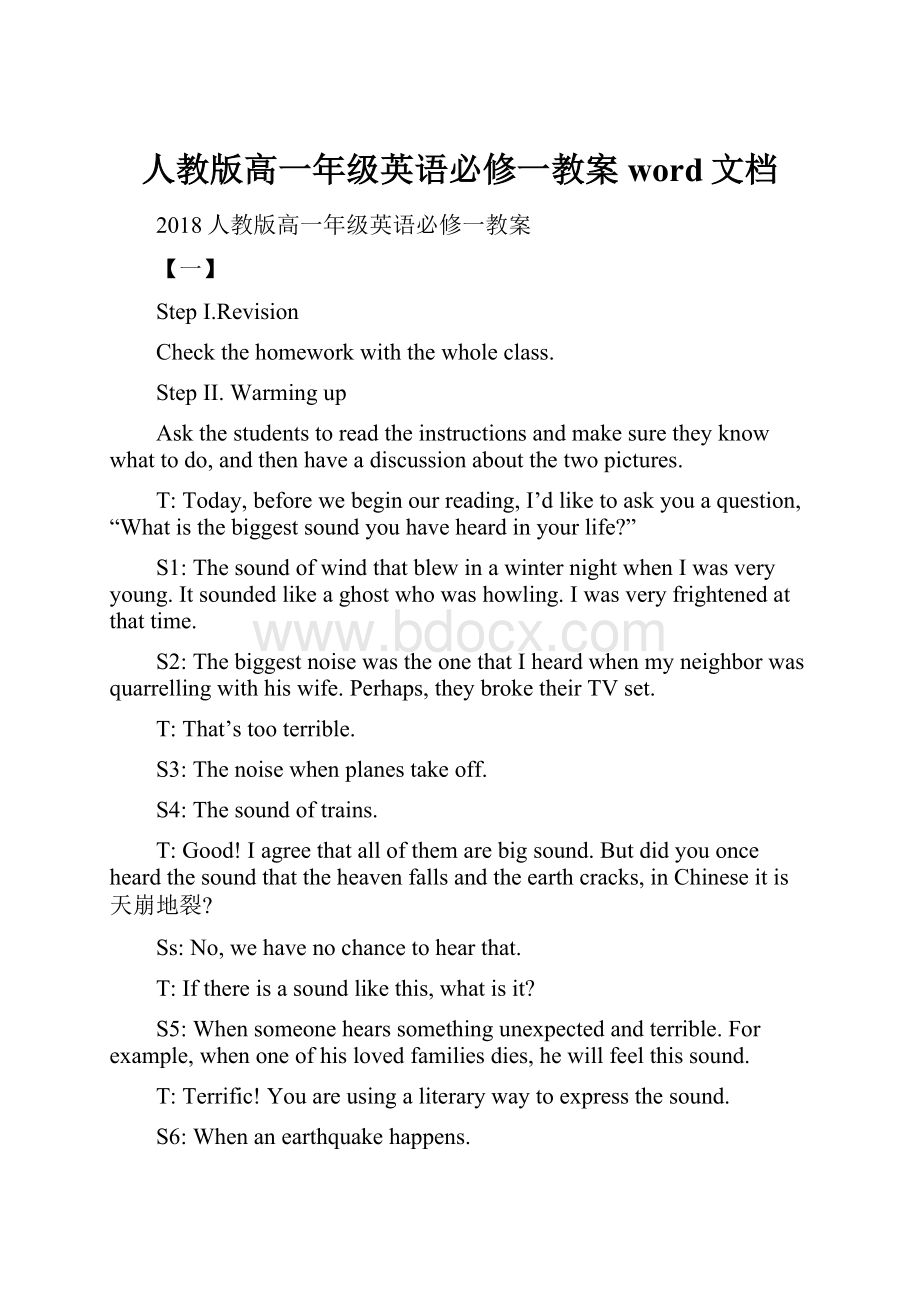人教版高一年级英语必修一教案word文档.docx
《人教版高一年级英语必修一教案word文档.docx》由会员分享,可在线阅读,更多相关《人教版高一年级英语必修一教案word文档.docx(9页珍藏版)》请在冰豆网上搜索。

人教版高一年级英语必修一教案word文档
2018人教版高一年级英语必修一教案
【一】
StepI.Revision
Checkthehomeworkwiththewholeclass.
StepII.Warmingup
Askthestudentstoreadtheinstructionsandmakesuretheyknowwhattodo,andthenhaveadiscussionaboutthetwopictures.
T:
Today,beforewebeginourreading,I’dliketoaskyouaquestion,“Whatisthebiggestsoundyouhaveheardinyourlife?
”
S1:
ThesoundofwindthatblewinawinternightwhenIwasveryyoung.Itsoundedlikeaghostwhowashowling.Iwasveryfrightenedatthattime.
S2:
ThebiggestnoisewastheonethatIheardwhenmyneighborwasquarrellingwithhiswife.Perhaps,theybroketheirTVset.
T:
That’stooterrible.
S3:
Thenoisewhenplanestakeoff.
S4:
Thesoundoftrains.
T:
Good!
Iagreethatallofthemarebigsound.Butdidyouonceheardthesoundthattheheavenfallsandtheearthcracks,inChineseitis天崩地裂?
Ss:
No,wehavenochancetohearthat.
T:
Ifthereisasoundlikethis,whatisit?
S5:
Whensomeonehearssomethingunexpectedandterrible.Forexample,whenoneofhislovedfamiliesdies,hewillfeelthissound.
T:
Terrific!
Youareusingaliterarywaytoexpressthesound.
S6:
Whenanearthquakehappens.
T:
Great!
Ihavewaitedforthisanswerforalongtime.Todaywe’lllearnsomethingaboutearthquakes.Ithinkmostofushaveheardofearthquakes.Canyouimaginehowterribleitis?
S7:
Theearthisshaking.Allthebuildingswillfalldown.
S8:
Manypeoplewilldie.Andperhapsmanychildrenwilllosetheirparents.
T:
Yeah,earthquakesaredisasterstoeverybody.NowlookatthetwopicturesofTangshanandSanFrancisco.Canyoudescribewhatyouseeinthepictures?
S1:
Tangshanisabeautifulcity.Ithasbeautifulgardens,broadroadsandsometallbuildings.
S2:
FromthepictureofSanFrancisco,Icanseethatitisaverybigcity.Therearemanytallbuildingsthicklystandingontheearth.Ithinkthepopulationofthecityisverylarge.
T:
Good!
Whatwillhappeniftherehasbeenabigearthquakeinthesetwocities?
Workinpairsanddiscussit.ThenI’llasksomeofyoutoshowyouropinion.
StepIII.Pre-reading
Therearetwoquestionsinthispart.Bothareveryinteresting.Thefirstonec
anmoreorlessrevealthestudents’values;whilethesecondonecanenlargetheirimagination.Nomatterwhattheiranswersare,aslongastheyhavegivencarefulthoughtstothesituations,theiranswersshouldbegood.
T:
Now,let’slookatthepictures.Whatarethepredictionsofanearthquake?
S1:
Beforeanearthquakeanimalswillbecomenervous.Cows,pigs,horsesanddogswillbeupset.Andpeoplecanseemicerunningabout.Iftheearthquakehappensduringwinter,peoplecanevenseesnakes.
T:
Terrific!
Wheredidyougetthisknowledge?
S1:
Fromgeography.Ilikeit.
T:
good.Sitdownplease.
S2:
Madam,Idon’tknowthemeaningofthepicturewithtwowomen.
T:
Itdoesn’tmatter.Youwillknowitsoonafterreadingourtext.OK.Imaginethereisanearthquakenow,andyourhomeisshaking,atthismomentyouhavenotimetotakeanyotherthingsbutone,whatwillitbe?
S3:
I’lltakeallmymoney.Peoplecan’tlivewithoutmoney.
S4:
Iwilltakeasmuchwateraspossible.Becauseitissaidthatpeoplecankeepalivefornearly7daysbydrinkingwithoutanyfood
S5:
Inthatcase,I’drathertakesomeapples,sothatbesidesdrinking,Icanalsoeat.
S6:
Iwillcarrymygrandma.Sheismymostlovedpersoninthisworld.Shebroughtmeup.
T:
Whatadutifulchildyouare!
I’mverygladtohearthat.Sitdownplease!
Itseemsthatallofyouknowwhatyoushoulddoduringanearthquake.OK.Let’sreadourtext,andseewhatittellsus.
StepIV.Reading
Inthispart,teachershouldaskthestudentstoreadthepassagequicklyforthefirsttimetogetthegeneralideaofthepassage.Askthemtopayattentiontothefirstsentenceofeachparagraph.Thiscanhelpthemfinishexercise3inComprehention.Itisaboutthemainideaofeachparagraph.Thenaskthemtoreadthetextagaincarefullytoobtainsomedetails.Beforereadingforthesecondtime,showsomequestionsonthescreen,andletthestudentsreadthequestionsfirst.Thesequestionscanguidethemtohaveagoodunderstandingaboutthetext.TheycanalsomakepreparationsforExs1-2,whichareaboutdetails.
Skimming
T:
AtfirstI’dliketoreadthetextquicklytogetthegeneralideaofthearticle.Whilereading,youshouldpayattentiontothesentenceofeachparagraph.
T:
Haveyougotthegeneralideaofthetext?
Ss:
Yes.
T:
Whatisit?
S1:
Thereisnoquickanswertothisquestion.Areyousuggestingusthatthegeneralideaisthemixtureofthefirstsentencesofeachparagraph?
T:
Sure.
S1:
OK.That’seasy.Themainideaofthepassageissomesignsoftheearthquake,andwhatwouldhappenduringthequake.
T:
Good,sitdownplease.Infact,whileweareansweringthequestions,wehaveinvolvedthesequence,thefunctionalitemforthisunit.(Teacherwritesthewordontheblackboard)Doyouunderstandthemeaningoftheword?
Ss:
No.
T:
Sequencemeanstheorderoftheevents.Itcantelluswhicheventhappensfirst,andwhichhappenslater.Doyouknowthesequencethatisusedinourtext?
S3:
Yes.Atfirst,thetexttellsussomethingthathappenedbeforethequake,thenittellsusthethingsthathappenedduringthequakeandatlastittellsusthethingsthathappenedaftertheearthquake.
T:
Quiteright!
Nowpleaselookatthescreen,thesearethefirstsentencesofeachparagraph.Readthemandthinkiftheyarethemainideaofthetext.Ifnecessary,youmaymakesomechangestomakemoreexact.
Teachershowsthescreenandgivesalittletimetothinkitover.
1.StrangethingswerehappeninginthecountrysideinthenortheastHebei.
2.Thedisasterhappenedandcausedalotofloss.
3.Allhopewasnotlost.
Carefulreading
T:
Now,it’stimeforustoreadthetextcarefully.Butbeforereading,youshouldreadsomequestionsfirst.Thesequestionsmayhelpyougetsomeinformationquicklyandeasily.Nowlookatthescreen,andreadthequestions.
Showonthescreen
1.Whatnaturalsignsofacomingdisasterwerethere?
2.Canyouthinkofsomereasonswhythesesignsweren’tnoticed?
3.Whateventsprobablymadethedisasterworse?
4.Whatsituationsprobablymadethedisasterworse?
5.Howwerethesurvivorsheld?
StepV.Extension
Showthequestionsonthescreen.
1.Fromwhosepointofviewareeventsdescribed?
Howdoyouknow?
2.Whatisthemoodofthispassage?
Howisitcreated?
3.Whydoyouthinkthewriterchoosestoexpresshisfeelingsaboutthequakeratherthansimplyreportingwhathadhappened?
4.WhyisthetitleANIGHTTHEEARTHDIDN’TSLEEP?
5.Whatdoesthesentence“Slowly,thecitybegantobreatheagain.”mean?
Answers:
1.Heusesthird-persontodescribethequake.Hisdescriptionisveryobjective.Forexample,thesecondsentenceinthethirdparagraph.Thewritersays:
“Everywheretheylookednearlyeverythingwasdestroyed.”Thewriterusestheyinsteadofwe.
2.Themoodisseriousandabitsad.Itiscreatedbygivingdetailsofhowmanypeopleandanimalswerekilledorinjured,andhowmanybuildingsweredestroyed.
3.Althoughthewriterwasnotthere,hefeltsadforthepeopleofTangshan.Heknowsthatsomepersonalfeelingswillmakethereadingmoreinteresting.
4.Ithinkthereasonisthat,asusual,nightisthetimetosleep,andnightshouldbesafeandquiet.Butthatnighteverythingchanged.ThewriterusesANIGHTTHEEARTHDIDN’TSLEEPasatitletoshowhowterribleandhowunusualthenightwas.
5.Herewecanseethatthewritercomparedthecitytoapersonwhosufferedalotinthedisaster.Hefeltherpain,andheworriedabouther.Sowhenhesaidthatpeoplecametohelpher,wecanfeelhisfeelingstothecity.Thecitywillnotdie,shehashopeandshecanrecoverfromthepain.
StepVIComprehending
AnswerstoExx1-3
1.1.C2.E3.B4.D5.A
2.1.Thewallsofthevillageswellshadcracksinthem.
2.Roadsgothugecracks
3.Brickbuildingsweredestroyed.
4.Thearmyhelpedthesurvivors.
5.Shelterswereputupforthosewithnohomes.
3.1.StrangethingswerehappeninginthecountrysideinnortheastHebei..
1.Thedisasterhappenedandcausedalotofloss.
2.Allhopewasnotlost.
StepVIIHomework
课后反思:
总体感觉上,本节课上得比较成功,心情愉快。
基本上完成了教学任务。
学生们不但对地震有了一定的了解,而且能用英语进行简单的描述。
但是同学们在讨论、汇报、回答问题时词汇单一,句式多是中国方的英语。
在今后的教学中要加强语句表达方面的训练。
【二】
一、教学内容Pre-reading;Reading;Comprehending
二、教学目标
在本节课结束时,学生能够
l认识节日的分类以及节日对人们生活的影响,从更深入的层面理解各国节日的意义。
l运用略读(skimming)、找读(scanning)、细读(carefulreading)等阅读技巧来掌握篇章中心内容,获取阅读文章中的关键信息。
l根据上下文,理解本课的生词、词组,如feast,gather,belief,dressup,playatrickon,admire,poet,lookforward,dayandnight。
三、教学步骤
步骤一略读(skimming)
1.学生看Reading中的图片和标题,两人一组讨论阅读材料中将介绍什么信息,完成Pre-reading的练习2。
鼓励学生在班内发表个人的见解。
2.老师指导学生快速浏览文章中的小标题和每个自然段的首句,了解文章大意,即不同的节日或庆典类型代表着不同的含义,有些是纪念死者的,有些是纪念着名人士的,有些是庆祝冬天的结束春天的播种、秋天的丰收、以及猎人猎到猎物等等。
教学意图:
快速浏览图片、标题信息、文章中的小标题和每个自然段的首句进行略读,可以使学生在较短时间内准确地找到文章的基本信息。
步骤二找读(scanning)
1.老师先让学生看“理解”中的练习1,了解节日的分类,老师可做必要的解释。
教学意图:
学生在把握了节日的分类后,他们在完成下列各环节时更有针对性。
2.让学生带着练习1中的任务通读一遍课文,重点阅读和练习有关的内容,快速找出练习所要求的基本信息。
教学意图:
通过找读,学生带着任务就可以快速获得练习1所要求的关键信息。
3.在老师的指导下,全班合作填写练习1表格中的第一行。
然后,老师要求学生独立完成余下的三行表格的填写。
学生完成表格的填写后,老师作点评。
教学意图:
学生在第一环节中完成了节日的分类、第二环节中找到了练习1中的关键信息后,学生在本环节进一步整合信息,完成练习1表格的填写。
步骤三细读(carefulreading)
1.学生仔细阅读课文,独立完成Comprehending中练习2的问题1~3,然后请几个学生回答,最后全班核对答案。
教学意图:
练习2中的问题1~3较4~5简单,通过细读全文,学生能够独立作答。
问题1~3的参考答案:
1)Festivalsofthedeadareforhornouringorsatisfyingdeadancestorsorothers,whosomepeoplebelievemightreturntohelporharmlivingpeople.
2)Autumnfestivalsarehappyeventsbecausepeoplearethankfulthatfoodisreadyforwinterandthehardfarmworkisfinished.
3)Atspringfestivals,peopleusuallyhavedances,c